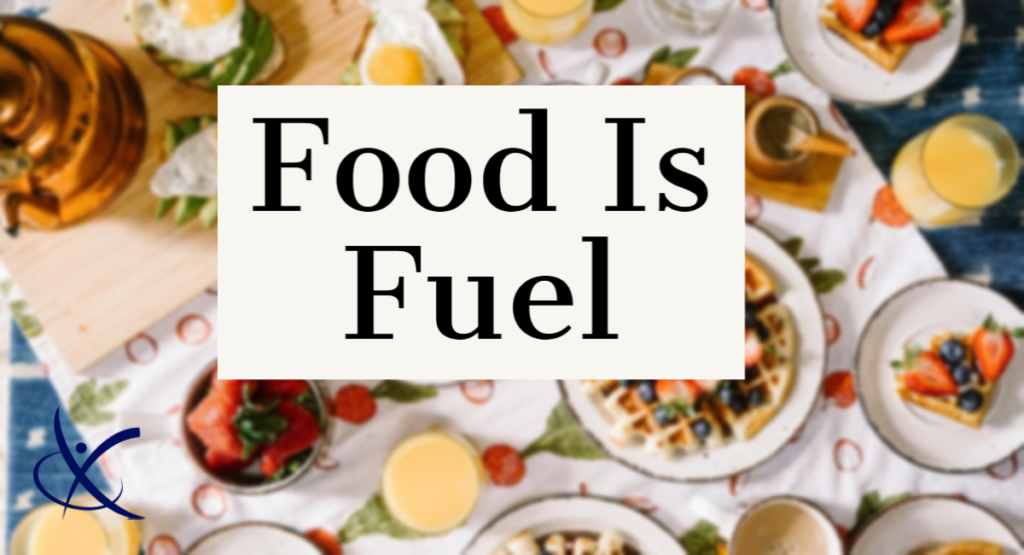Food is Fuel
How Healthy Relationships with Food Matter
If I had to describe my collegiate soccer career, it would be lackluster. I was the epitome of a mess. Consistent injuries, two surgeries, poor rehabilitation tactics, and a poor relationship with food did not help. I was training 6 days a week with minimal energy and less than stellar performance. I would often have my standout moments and boom, here comes another injury. Not one coach, physical therapist, parent, or athletic trainer ever asked me about my eating habits. Not one talked to me about food being fuel for healing or performance. I think back and tell myself that if I knew then, what I know now, things would have been SO much different (I’m pretty sure we all think this at some point, right?).
This subject is a touchy one. It makes me uncomfortable even just typing about it. I was never diagnosed with an eating disorder, but I can sure tell you that my eating WAS disordered at this point (in all honesty, I do believe it started after my ACL surgery my sophomore year of high school). My weight waxed and waned regularly. One year I would look ultra-thin, the next year a heavier healthier version of that. I may have “felt healthy” and enjoyed the way I looked, but I was never truly a healthy collegiate athlete. My energy was low and my performance even lower.
It is hard to discuss eating habits with athletes, especially those who are injured or not performing well. Weight is something most athletes tend to be concerned about. What some fail to realize is a lack of eating can cause intermittent weight gain. In our youth athletes, lack of food and energy availability can also cause decreased bone growth after only 5 days of low energy availability. What does that mean? A younger athlete with poor eating over a sustained period can develop things such as osteopenia and osteoporosis and have a significantly higher risk for injury and fracture.
Low energy does not only affect our athletic performance and bone health. Aside from demonstrating decreased power, strength, and endurance, an athlete may also notice negative effects on many other body systems. Often, with low energy we see changes in mood (agitated, sluggish, increased anxiety), GI distress, irregular menstruation cycles in females, changes in skin appearance, and decreased body temperature. So, weight is not the only thing that should alert us that an athlete is having some sort of poor relationship with food!
We need to talk about this with our coaches, athletes, parents, and friends. We need to recognize that food is fuel and a lower weight does not always mean high performance. I read stories about runners, soccer players, gymnasts, etc., who have all suffered from similar eating challenges throughout their lives. Many have experienced repetitive stress fractures, muscle pulls, muscle tears, and generalized performance loss. Healing from their injuries took longer than most and many ended up re-injuring shortly after returning to sport. One thing I should note is that these athletes may feel great for a short bout of time (start of a season), and then suddenly, things really start to go sour.
As I have gotten older and entered the physical therapy profession, I see more and more athletes having unhealthy relationships with food. I often observe this in individuals going through the rehabilitation process. I also see it on a regular basis with many performance athletes where an emphasis is placed on appearance. Let us change the narrative when talking about performance and food. Why is it not part of something we start talking about with athletes from a young age?
I do not want you or your youth athlete to end up in my shoes. Please note, it does not take getting to college to have a poor relationship with food. This can occur at ANY age. If you would like to do some individual reading on this, check out this awesome book by an esteemed colleague! I do not often recommend this, but you can also type in RED-S in google and learn a lot about what we now term Relative Energy Deficiency in Sport.
Please note, I am a physical therapist and not a dietician. I know generalized information about this topic. If you need assistance in the realm of dietetics, I can refer you to some great individuals who work with athletes regularly! ?
Ashley Witson, PT, DPT
